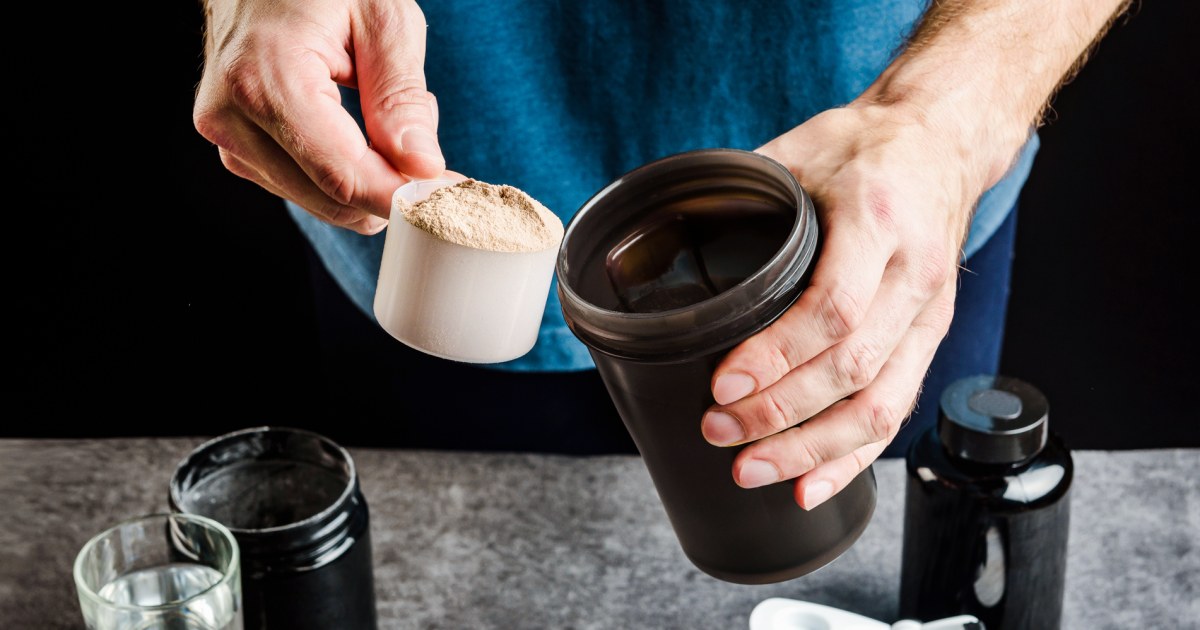Overuse of muscle-building products associated with body image condition

Muscle-building supplements are increasingly popular with teen boys and young men. New research suggests overuse of products like whey powder or creatine may be affecting young people’s mental health as well as their their physical health.
A Canadian study, published Wednesday in the journal PLOS Mental Health, finds that young people who consume multiple muscle-building products are more likely to show symptoms of a condition called muscle dysphoria.
About 2,730 Canadian teens and adults ages 16–30, mostly white males and females, were recruited via Instagram and Snapchat advertisements. They were asked about their use of six different common workout products — amino acids, creatine monohydrate, pre-workout drinks or powders, protein bars, weight or mass gainers, and whey protein shakes or powders. Protein bars were the most commonly consumed, followed by whey protein shakes or powders and creatine.
The study also asked about body image, asking for responses to statements such as, “I feel like I have too much body fat” or “I feel depressed when I miss one or more workout days.”
Whether they used supplements or not, 26% of the boys and men scored above the level for muscle dysmorphia — that is, being extremely preoccupied with a perceived lack of muscle mass or tone.
Use of the workout supplements and products was associated with more symptoms of muscle dysmorphia, what the researchers called greater “drive for size” (the desire to have bigger muscles) and “functional impairment” (the inability to work or maintain a social life).
On the positive side, young people who used supplements were generally satisfied with how their bodies were responding to them, the study showed.
Boys and young men can be susceptible to fixating on their muscles, which can lead to obsessive thoughts and exercising to build muscle — weightlifting for many hours a day, for example — to the point it interferes with daily life, Kyle Ganson, lead study author and assistant professor of clinical social work at the University of Toronto, said.
It’s not known how many people in general are affected by this kind of body dissatisfaction, but it’s thought to be “quite rampant in the gym space,” Ganson said.
Ganson said the findings reflect data and trends seen in the U.S. as well. About 55% adolescents and young men in the U.S. use bodybuilding supplements, according to some estimates.
The Council for Responsible Nutrition, a trade association and lobbying group that represents businesses that manufacture supplements, said in a statement released after the study: “The most obvious explanation is that people who are dissatisfied with their appearance take steps to change it. That might mean adjusting their diet, exercising more, or taking supplements to support their goals. In fact, the study itself found that supplement users were actually more satisfied with their progress than non-users.”
Experts said the findings spotlight how unrealistic body ideals — often fueled by fitness influencers who promote or sell workout supplements online — may be driving more children and young adults to overuse powders or pills.
It doesn’t help that many fitness influencers use filters that deceive others into thinking their appearance is real or naturally attainable, said Dr. Jesse Mills, a urologist and men’s health specialist with UCLA Health, who was not involved in the study.
“It’s a global trend towards anime-like figures and cartoonish proportions,” Mills said. “I really think body dysmorphia in general is the new pandemic.”
In a study Ganson published last year, nearly half of respondents said online influencers who promoted workout supplements were a “primary” motivation for their own use of the products. The hashtag #creatine, for example, has over 382,000 posts, many of which are flagged with “creator earns commission” warnings.
The pressure to meet muscular body standards may motivate young men and boys to use supplements more often, to the point where “it’s like second nature,” Ganson said.
Interestingly, among girls and women, supplement use was also associated with stronger desires for bigger, more toned muscles.
The study’s findings underscore the dangerous reality that “companies are profiting off the mental health distress of young people,” said S. Bryn Austin, a social epidemiologist and behavioral scientist at the Harvard T.H. Chan School of Public Health, who was not involved in the study. “We have a public health problem here.”
What’s more, these companies don’t have to prove their products’ safety before hitting the market, Bryn added. Some bodybuilding supplements have been found to be contaminated with prescription drugs, anabolic steroids and toxic heavy metals like lead and cadmium, according to a recent report by the Clean Label Project.
Evidence is mixed whether the supplements do all they claim, like enhance athletic performance and improve muscle stamina. But when used appropriately, many of the ingredients in muscle-building supplements such as whey protein are safe. Some, like creatine, have been shown to boost muscle mass and strength.
Using supplements isn’t “inherently problematic,” Ganson said. Once started, though, “it’s kind of like a Pandora’s box,” especially for boys and young men who often turn to social media for advice. “That’s why you should be careful when taking these supplements; they can only support your goals in so many ways.”
Mills, the men’s health specialist, cautioned that, for some young men, supplement powders may not be enough.
“Imagine you’re an impressionable 18- to 25-year-old who’s working out but not seeing the gains that other guys have,” said Mills, who emphasized that genetics can make it harder for some people to grow muscle. “That is certainly a gateway to, ‘what else is out there?’”
Bryn’s team conducted a study published last year in the journal JAMA Network Open that followed 4,000 boys and young men ages 10–27 over 14 years. The group found that people who used muscle-building supplements were eight times more likely to start anabolic steroids compared to those who didn’t.
Steroids are “an incredibly effective way to put on lots of mass in a very little bit of time,” Mills said. Because even low doses are associated with side effects, this dangerous mental and physical cycle has become a “public health concern.”
link






